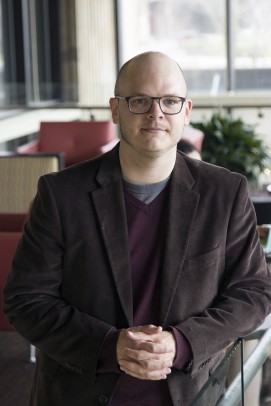Dangerous lives of Somali migrants

Tyler Miller, a doctoral candidate in history, tells the stories of Somali migrants who found work in meat processing plants. — Photo: Jenny Fontaine
They came from their war-torn homeland to the Upper Midwest to work in this country’s most dangerous industry.
Tyler Miller, a Ph.D. candidate in history, tells the story of Somali migrants who took jobs in meat processing plants.
Somalia, in the Horn of Africa, erupted into civil war in 1988, with the government fighting northern insurgents until its collapse in 1991.
The story is the background for a 2001 film directed by Ridley Scott. The movie “Black Hawk Down” centers on the Battle of Mogadishu, on Oct. 3 and 4, 1993, during which two U.S. Black Hawk helicopters were destroyed.
But the impact on Somalia’s population was greater than on the U.S. military.
“The war produced the largest refugee crisis in recent African history,” Miller said.
Most of the Somalis migrated here as formally resettled refugees as designated by the U.S. State Department, he said.
“I’m trying to explain why they came to the Upper Midwest, in particular Min-
neapolis,” Miller said. “Many first came to San Diego and East Coast cities — New York, Philadelphia, Boston — but a limited number of jobs there made life difficult.”
Minneapolis became home to an estimated 25,000 to 70,000 Somalis.
Why the wide disparity? “The census doesn’t distinguish between new African migrants and native-born,” he said.
Also, the lower estimate reflects the impact on public school enrollment, while the high end includes growth in the Somali community.
“I considered structural changes in an industry characterized by declining wages and safety regulations in an attempt to explain the ‘migrantization’ of the labor force,” Miller said.
Meat processing is “kind of a gateway industry to bring in Somalis,” he said.
“All the major meats” are involved, he said, primarily poultry — especially turkey — pork and beef.
“The work requires very few skills and little English, and there was pressure from the government to get them employed as soon as possible.”
Many of the migrants are engineers, college graduates or skilled laborers, but lack the needed documentation.
Unfortunately for the Somalis, the meat processing industry no longer pays the relatively high wages it once did.
“Companies refurbished small plants in small towns, with the result of decreased worker organization and safety so that it is the most dangerous industry in the U.S.,” Miller said.
Part of the reason it’s dangerous is a huge increase in productivity.
“They used to slaughter 300 animals a day — it’s gone to 900 a day,” he said.
“It’s highly automated, requiring little skill. This rapid rate is what has pushed safety standards down.”
In addition to being dangerous, the work of slaughtering animals is, of course, extremely unpleasant.
Another source of stress for the Somalis is that 99 percent of them are Muslim, Miller said.
Handling pork conflicts with their religion. Also, there have been disruptions at plants in Minnesota and Colorado because Somalis claim they’ve not been provided time and space to pray, and that work shifts aren’t conducive to obligations of prayer and cleanliness.
Miller notes that the work “no one wants to see” is conveniently hidden behind factory walls. This, he said, is “the politics of sight — a hideous form of consumption made palpable by invisible production.”
Miller developed an interest in the Somali migrants after studying the history of neighboring Ethiopians and taking courses in labor history and refugee resettlement.
He grew up in Jackson, Michigan. He earned a bachelor’s degree in history at Spring Arbor (Michigan) University and a master’s in history at Western Michigan University in Kalamazoo.
He plans to complete his Ph.D. in the spring of 2018, then “look at the academic job market,” he said.
“I’m also interested in [teaching] in secondary education, and I’m also looking at immigration policy with NGOs or advocacy groups.”
In leisure hours the Irving Park resident “reads everything, voraciously” and spends time outdoors. He recently tried snowshoeing in Lake Geneva, Wisconsin.
Miller is using Every 12 Seconds: Industrialized Slaughter and the Politics of Sight, the 2011 book by anthropologist Timothy Pachirat, as an “analytical lens” for his work on the Somalis.
Pachirat went undercover, disguised as a worker in a Nebraska plant, to write this “tell-all work about what life is like inside a plant,” Miller said.
The book’s title refers to the average rate at which an individual cow is killed and dismembered in a processing plant.
Categories
